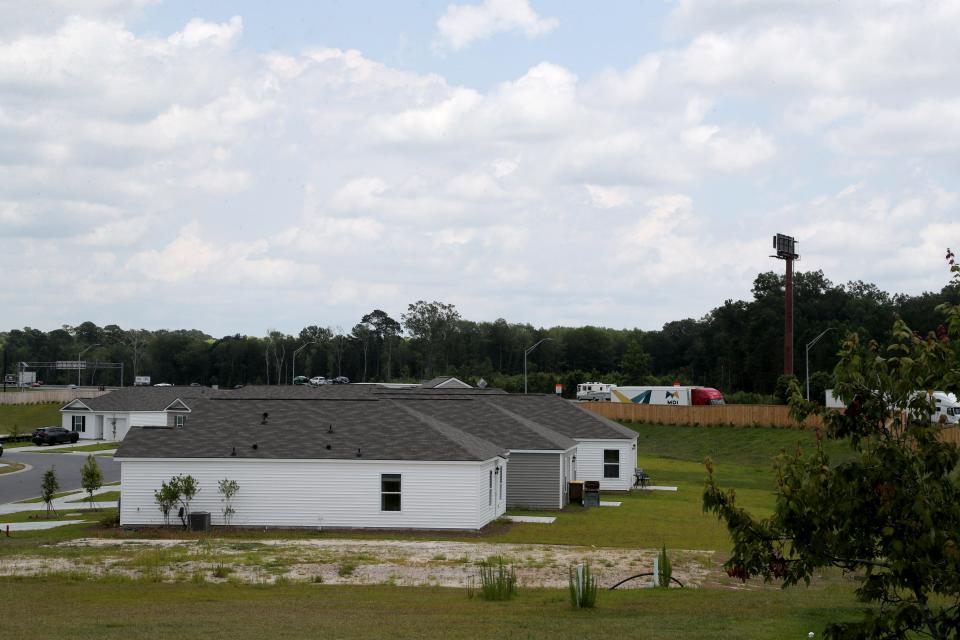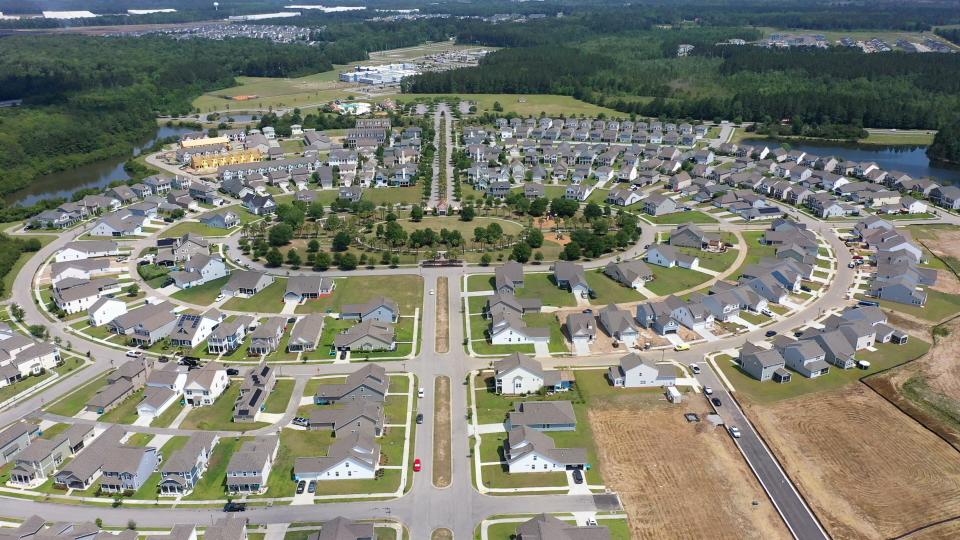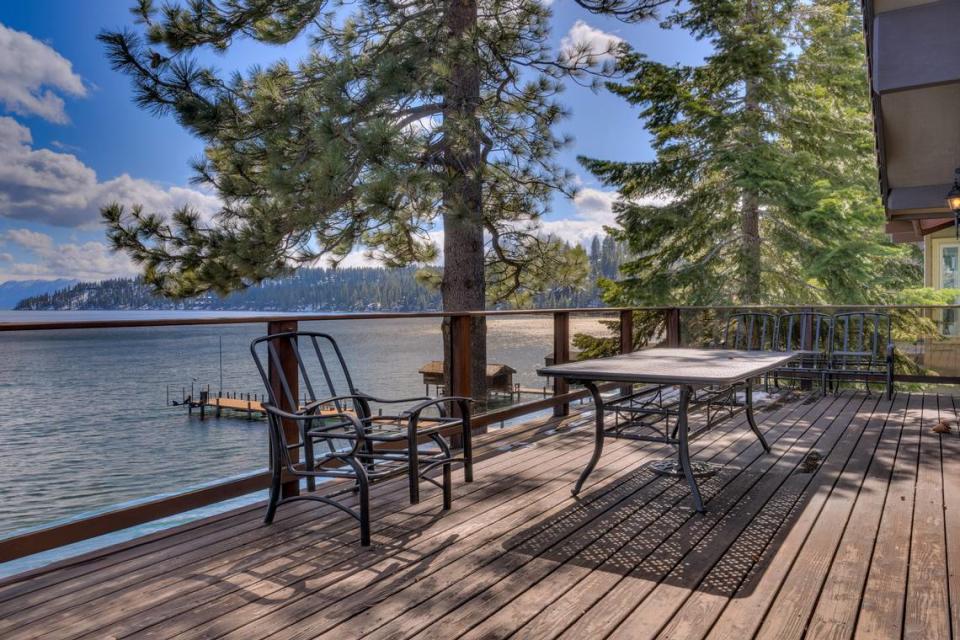At this time two years ago, 60-foot-tall pine trees loomed between Interstate 95 and the residents of Rice Hope. There in Port Wentworth, they had grown for at least 20 years, providing habitat for wild animals, fresh air, shade and most important to some, a sound barrier and protection from the busy highway.
In mid-June 2022, every single tree was cut down, according to Tara Johnson, a five-year resident of Rice Hope, to stuff one-story cottages into the neighborhood that already held hundreds of homes. It’s transformed the once safe and quiet neighborhood to “living adjacent to a busy interstate with a parade of semi-trucks day and night.” Though they knew more homes were going to be added, no one expected the decimation of the tree line.
Now, 28 homeowners have partnered and retained a law firm, gearing up to sue the City of Port Wentworth and the developers of Rice Hope. They are seeking assistance with expenses through a GoFundMe.
Although the lawsuit has not been filed yet, the homeowners are alleging that the city neglected to do a comprehensive review of the plans submitted by the developer.
Additionally, residents believe that even the solution provided by the city, a wooden fence parallel to I-95, lacked a comprehensive review of necessary and “easily accessed” information from GDOT about tempering highway noise before being implemented.
This has caused a number of issues, Johnson said: full views of I-95 from the second stories of their house, 24-hour highway noise, loss of use to outdoor areas, depreciation of home value despite the lakefront view, and overall effects on the health and wellness of the neighborhood.
Port Wentworth City Council talks amphitheater, warehouse rezoning
Garden City panel slams brakes on project backed by Federal Highway Administration
Failure to do comprehensive reviews
The site plan that set the removal of the entire tree line in motion was approved by both the sitting members of Port Wentworth’s 2021 planning commission and city council.
Two of those planning commission members – Rufus Bright and Gabrielle Nelson – now are both current city council members, who were elected to a council that unseated three incumbents in November that year.
Just months after the site plans were approved, major shakeups changed the composition of Port Wentworth’s city administration, beginning with the resignation of the then-city manager Edwin Booth and mass walkouts. The city was also tasked with, in 2022, redoing its 2021-41 comprehensive plan, the document that governs future land use and development within a city.
This comprehensive plan was adopted in August before the site plans for the new homes of Rice Hope were approved. In the character area description for suburban residential areas, the comprehensive plans states that developments require the preservation of trees during the development process and post development. The developer also violated the city ordinances by not getting city permits prior to ground disturbance, and for not installing environmental protections prior to construction.
“So, it was basically a bunch of people not doing their job,” Johnson said. “I reached out to the city to see what was going on, and they put a stop work order on the whole site because they were even upset about it. They didn’t realize what was about to happen, let it happen and in the midst of it they destroyed an entire corner of the neighborhood.”
Johnson, spearheading the charge, reached out to a number of people after the landscape was flattened, including the developer, newly hired City Manager Steve Davis and newly elected city council member Nelson. Davis placed the stop work order on the property after seeing the site.
Nelson said she didn’t realize at the time of approval that they would be clear-cutting the trees and asked for the developers to be fined, which they were, after they discovered it had already been done.
“There’s also a difference in someone asking for a rezoning and asking for a site plan to be approved,” Nelson said. “With a site plan, if they checked all of their boxes, got all of their permits and everything it seems personal to just say, ‘no, I don’t want this,’ and they could sue.”
In an email to Johnson in July 2022 , Davis stated that the city administration had met with the developer, requiring them to increase the size of the earth berm from 4 ft to 10 ft. Additionally, they would be required to place a 6 ft tall privacy fence on top of the berm, and install a mixture of pine and cypress trees on the interstate side of the berm and plans on the homeowners side of the fence.
“The main thing for this lawsuit was everything the city promised that they would try to do to help us, they didn’t follow through with most of it,” Johnson said. “Their fix did not work, their fix was not even what they promised us – the average height of the majority of the berm/fence is 11-12 ft.”
The Federal Highway Administration has guidance on highway traffic noise abatement, stating that noise barriers do very little good for homes on a hillside overlooking a road, which rise above the barrier and to avoid undesired effects, the general rule is that the barrier should extend four times as far in each direction as the distance from the receiver to the barrier.
Additionally, it says that noise barriers and earthen berms are only beneficial to homes in the “shadow zone,” the space right next to the barrier. Unshielded homes get none of the protection of the noise barrier, plus the view of the interstate. Openings in the barrier also reduce the effectiveness of it, which the Rice Hope fence has.

Fears and concerns
Melanie Munton, who’s daughter just turned 6, and Celina Hall, who has her grandchildren visiting frequently, said at the top of their list of concerns is safety because of the proximity of the Georgia welcome center.
“In five minutes someone could come off at the interstate, have your child back in a car and across the state line before you even knew they were missing,” Hall said. “We have too much trafficking and kidnapping that’s going on all across the country.”
Lisa Barrow, who moved to Port Wentworth from Kentucky in 2021, agrees with the sentiment.
“That is nothing more than a wooden fence,” Barrow said. “There is no protection, if one of those semi’s lose control they’d just come right through that fence. Before, we were heavily wooded and you couldn’t really see our neighborhood from the highway and now we’re heavily exposed.”
A lot of residents moved to Rice Hope, to the lakeview properties and paid thousands extra for the serenity, peace and privacy of the area. Barrow said they looked at multiple properties in the area and absolutely loved the lake and the character of the neighborhood.
“We moved here in hopes of this being our retirement homes,” Barrow said. “We laughed and said this is it, we’re not moving again. Now we’re no longer sure.”
One resident moved in with her sister due to the highway noise, which after testing it with a sound meter Johnson said can reach up to 70 dB. Another resident plans to put her home on the market this month to get away from the noise. Dan O’Connor and his wife Melissa got their house appraised and were told the value dipped by $100,000 because of the noise from I-95.
Another major cause of concern is the loss of sleep due to the near-constant noise from the highway, something that was raised by multiple residents who have jobs that require them to be up early.
“My husband and son, physically you can tell they’re tired,” Johnson said. “My son’s dark circles are just getting darker. When trucks are going too fast, they’ll use their engine to brake and slow down and for some reason in the middle of the night they’re all doing it. It lasts only about 10 seconds but it’ll wake you up out of a dead sleep.”
Johnson firmly stated that the wall has not done anything to stop the noise, just penetrating directly into the second story of their home, and going outside to just have a conversation either in-person or on the phone is a task.
“Before, it was beautiful,” Johnson said. “We could sit outside and everyone once in a while a super loud truck would go by, but you never really thought about it because you couldn’t even see them.”

Going Forward
The optimal solution in the end for all of the homeowners is the same: a concrete barrier this time.
“An actual GDOT approved concrete barrier,” Johnson said. “We need somebody, we don’t care who it is, to erect this wall to stop the noise from coming in, and to stop the view.”
The GoFundMe goal for the litigation is set at $10,000, and they have raised $850 so far.
Destini Ambus is the general assignment reporter for Chatham County municipalities for the Savannah Morning News. You can reach her at dambus@gannett.com
This article originally appeared on Savannah Morning News: Rice Hope residents to sue Port Wentworth for view, noise pollution
Signup bonus from





